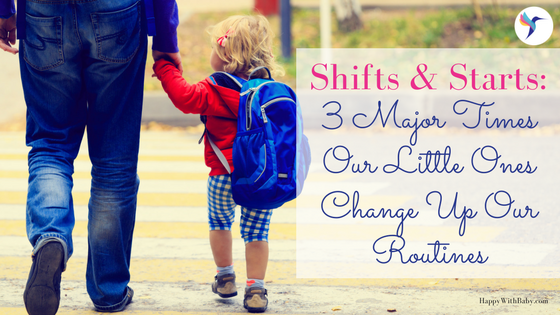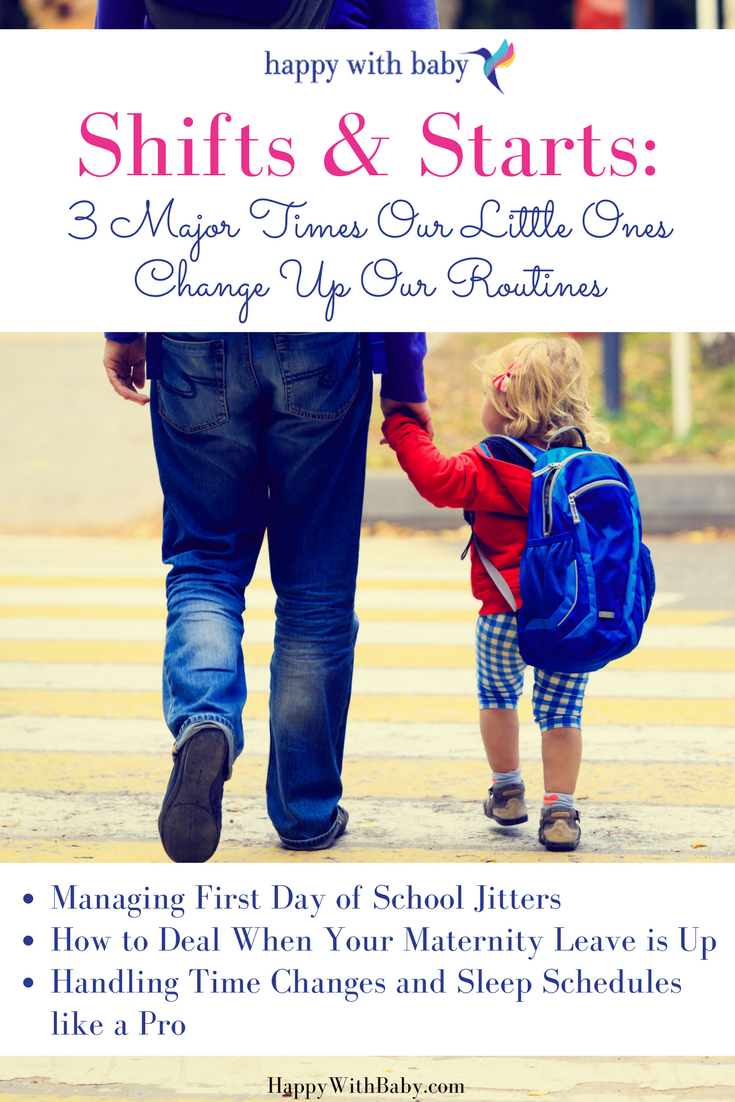Shifts & Starts: 3 Major Times Our Little Ones Change Up Our Routines

I don’t know about you, but lately, my Facebook newsfeed is filled with adorable first-day-of-school photos.
I love it. You can see the anticipation in their little faces and I completely understand what those moms and dads posting them must be feeling.
This time of year always makes me a bit reflective about transitions. And I can’t help but think about how parenthood is constantly insisting we grow right along with our kids.
Three major times of transition immediately come to mind: The first day of school, the first day back to work after maternity leave, and, because shifts in sleep rhythms are almost constantly throwing us for a loop, the “fall back” and “spring forward” time changes.
I want to help you move through these transitions with as much ease as is humanly possible, so here are my top tips for getting through them.
The First Day of School:
If your child is starting preschool or elementary school for the first time, this is likely an emotional time for both of you. Your child might be nervous, scared, excited, or all of the above. You might be sad, relieved, nervous, or excited yourself. It’s a big milestone for both of you!
Because often parents let their little ones stay up a little bit later in the summertime, you can make the back-to-school transition easier by beginning to set a new sleep routine for your little one a couple of weeks in advance of school starting.
You can do this incrementally in 15-minute intervals each night for a week or two. Or, you can try making a more dramatic shift in their sleep habits by skipping a nap so they go to bed earlier that night, or waking them up earlier than usual in the morning, so that they’ll be ready for an earlier bedtime later. The key is doing it at least a week in advance of school starting so that the habit is already in place.
A rough morning can really set the tone for the rest of the day, so anything you can do to make the morning calmer and more pleasant is a good idea. This might mean that you get up extra early before the rest of the house wakes, so that you can have a few moments of calm first. It might mean that you leave extra early to drop your child off, so you don’t feel rushed in traffic or like you’re hustling your kid around the house.
It’s also a good idea to make sure there’s no TV or other distractions until after they’ve done their getting ready routine, so that you’re not scrambling to get them to brush their teeth at the last minute. It can be helpful to make a list of the things to do before leaving for school (get dressed, eat breakfast, brush teeth, put shoes on, make bed, turn off bedroom light, etc.) and the reward options for them if everything is done before they leave (TV, games, play time, etc.).

If your child has fears about starting school or separating from you, help them to ease into things by taking them to meet their teacher before school starts. Or, if you can hang out for the first half hour on the first day, so that your child feels secure to explore their new surroundings. This does help some children.
If this transition is emotional for you, make sure you give yourself time to pause and sit with what you’re feeling. Especially if you’re a stay-at-home or work-from-home parent--your little sidekick is suddenly no longer right by your side every hour! It’s a big deal! Treat yourself to a fancy coffee or take a walk. And, don’t forget to take those back-to-school photos. You’ll cherish those forever.
When you pick up your child after their first day, why not celebrate their bravery? Take them out for ice cream and ask them what they liked about school, what was scary or hard, and who they played with. One of the best things about your child starting school is that now you can have little conversations with them about their day. (Oh, to be a fly on the wall of that classroom….)
Going Back to Work After Maternity Leave:
The big thing here is to be patient with yourself. This is a big change.
And regardless of the length of your maternity leave, it will likely seem too soon (although there are definitely moms out there that CAN. NOT. WAIT. to get back to work, in spite of how much they love being a mom).
If you’re in the seeking childcare phase, you might want to check out this post I wrote about how to find the right fit for you and your little one. It’s amazing how much relief you can find in just finding the right caregiver or daycare facility. It will take a load off your mind.
After that, be gentle with yourself and resist the urge to make any abrupt changes (like cutting your hours or working remotely from home). When you’re having all the big feels, it can take some time to sit with what you’re feeling to really decipher what it is you actually need. This will come with time.
It’s easy to romanticize staying home with your baby (and for some parents, staying home is absolutely the right choice), but if you know that it isn’t for you or that you can’t just quit your job, it can be helpful to remind yourself that being home with your baby isn’t all snuggles and bliss. Sometimes there are moments when we have to leave the baby in their crib to cry because it’s all too much. Sometimes staying at home with the baby is really, really hard. It’s easy to have selective memory when the time to return to work comes around.
You also might find it helpful if your caregiver is willing to text you photos or video of your baby from time to time--especially on the first day or when your baby achieves a new milestone. Talk to your caregiver to see if that is an option, and if you think that will help.
Often it is much harder for the parents to leave the children than for the babies themselves to be left. I had a client tell me once that someone commented on how sad their young baby was going to be for being left at daycare. This really upset the parent and made them feel even more guilty than they already did.
I want you to resist that guilt as much as you can.
Yes, parents, of course transitioning to daycare and back to work is hard, but my hope is that you’ll find some relief in knowing that your baby will adjust more easily than you fear they will.
Time Changes and Sleep Schedules:
When we “fall back” in November, the common thought is that we gain an hour of sleep. But, if you’re a parent, this probably won’t be the case for you. (I know, I know...we just can’t catch a break, can we?) If you have an infant or toddler, they may fall asleep at bedtime just fine, but don’t be surprised if they wake an hour earlier than usual due to the change. The good news is, once your little ones start school, you might find that getting them up on time in the mornings is a bit easier.
To ease the transition, you can approach it one of two ways:
1. Starting a week before the change, you can try putting your little one to bed 10 minutes earlier (working incrementally) each night. This might make the transition more easeful for both of you.
Or, 2. You can just jump in with the shift the night that the time change happens. This might make for a fussy baby or a cranky child for a day or two, but they’ll likely adjust quicker this way than with an incremental change.
Also, making sure that your baby doesn’t nap too late in the afternoon and doing your best to keep their daytime routine the same is helpful.
Ultimately, there’s no wrong way to do it--you just need to know what to expect and how it might affect both you and your baby, so you can make the best choice for your family. Kids--babies in particular--are really adaptable to things like sleep schedule changes. So, keep in mind that if their sleep schedule is thrown off, you can get them back on track with consistency. And the main thing is the number of hours of sleep on average they’re getting each day and making sure they’re not chronically sleep deprived. Check out this sleep guide to make sure your little one is getting the right amount.
With the right amount of patience and prep, you can totally handle any shift that comes your way. Just remember, these phases are always temporary no matter how hard it feels right now. You and your little one will get through it.
So, now I’m curious. Which transition is your family currently in? Which major transition would you add to this list?
Subscribe
Sign up to get the latest weekly blogs sent straight to your inbox


0 comments
Leave a comment
Please log in or register to post a comment